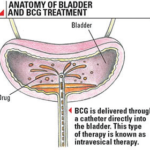Bacillus Calmette-Guérin (BCG) is a live vaccine, which is given to treat early-stage bladder cancer and helps prevent the cancer from recurring. When the medication is put into your bladder it causes inflammation. This inflammation destroys tumors and cancerous cells, therefore helping to stop the cancer from growing and spreading. Different types of vaccine therapy are also available for kidney cancer, testicular cancer, and prostate cancer, among others.
BCG instillation is done by inserting a catheter into the opening of the urethra, then into the bladder. When the catheter is in the bladder, BCG will be passed through the catheter into the bladder. The medication should be retained in the bladder for two hours to obtain the best results. The usual course of treatment is once a week for 6 weeks. Additional treatments may be needed and will be determined by your urologist.
Are there any possible side effects from the treatment?
You may experience some, usually short-lived, voiding discomfort following your treatment. The discomfort should last no more than 24 hours.
- Pain and/or burning when passing urine
- Blood in your urine
- Urinating frequently
- Flu like symptoms (joint pain, mild fever, cough, chills, fatigue

